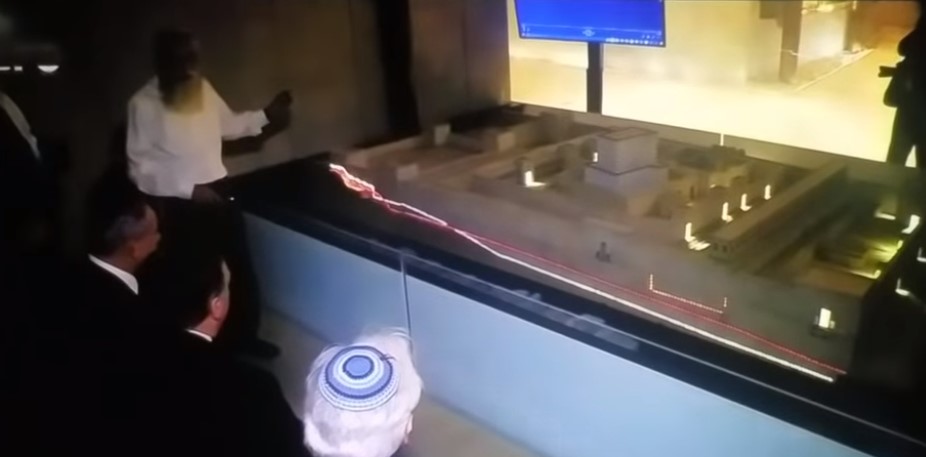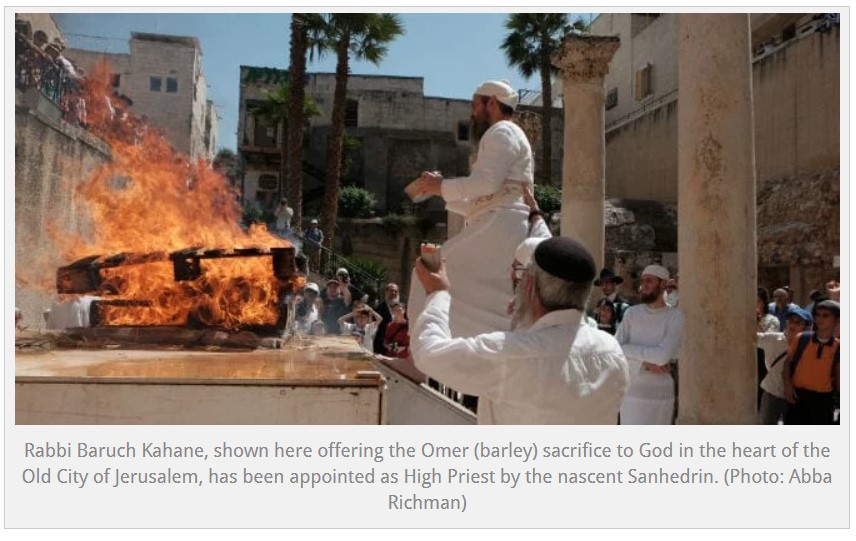Recently, an underground synagogue for the nascent Sanhedrin has been revealed, built under the Western Wall. This synagogue contains 72 seats for the elders of Israel, and 24 for the acolytes. One assumes there is room also for a Nasi for the Sanhedrin. These numbers are interesting.
At the very center of the synagogue is a giant pomegranate, in gold, and covered with Ivriyt text.
What is the thinking behind this? It is found in the prophet Chaggai:
Chaggai (Haggai) 2:18-19
Consider now from this day and upward, from the four and twentieth day of the ninth month, even from the day that the foundation of YAHUAH’S Temple was laid, consider it. 19 Is the seed yet in the barn? yea, as yet the vine, and the fig tree, and the pomegranate, and the olive tree, has not brought forth: from this day will I bless you.
Hag 2:19 הַעוֹד הַזֶּרַע בַּמְּגוּרָה וְעַד־הַגֶּפֶן וְהַתְּאֵנָה וְהָרִמּוֹן וְעֵץ הַזַּיִת לֹא נָשָׂא מִן־הַיּוֹם הַזֶּה אֲבָרֵךְ׃
Ha’ode ha’zerah b’megurah v’ad ha’geffen v’ha’te’ehnah v’ha’rimon v’etz ha’zayit lo nasa min ha’yom ha’zeh.
Given the pomegranate, when do you expect the foundation stone of the temple to be set?
It will be on the 24th day on the ninth month, which in real terms is the 24th of Shevat, next year appearing on January 19, 2020.
Plans for the new temple are contained in the underground synagogue:

Just this last week, United States Secretary of State Mike Pompeo joined the leadership of the nation of Israel to sign historic documents in this synagogue.

This synagogue fulfills other scripture, should one chose to look:
Yechezq’el (Ezekiel) 8:8-12
Then said he unto me, son of A’dam, dig now in the wall: and when I had dug in the wall, behold a door. 9 And he said unto me, Go in, and behold את eth-the wicked abominations that they do here. 10 So I went in and saw; and behold every form of creeping things, and abominable beasts, and all the idols of the house of Yashar’el, pourtrayed upon the wall round about. 11 And there stood before them seventy men of the ancients of the house of Yashar’el, and in the midst of them stood Ya’azanyahu the son of Shaphan, (the Nasi?) with every man his censer in his hand; and a thick cloud of incense went up. 12 Then said he unto me, son of A’dam, have you seen what the ancients of the house of Yashar’el do in the dark, every man in the chambers of his imagery? for they say, YAHUAH sees us not; YAHUAH has forsaken את eth-the earth.
To be fair, the synagogue does not appear to have the signs of the zodiac on the wall. But when we look at the passage in Yechezq’el, we see that creeping things can also be simply called reptiles, and abominable beasts can equally be called filthy or idolatrous animals.
The temple menorah has been enclosed down here, as well as the temple artifacts, and it is reported that the recent altar of the reinitiated blood sacrifice is also held within these walls, bringing with it the spirit of abominable beasts of sacrifice.
It is possible as well, that the reptile and idolatrous behemoth that are described in this verse discusses the ruachoth (spirits) of the leadership within. Not a pretty image, to be sure.
Recall that there are an addition 24 chairs in the synagogue, and of course, we make room for the Nasi, who will lead this group:

Yechezq’el (Ezekiel) 8:15-16
Then said he unto me, Have you seen this, O son of A’dam? turn yet again, and you shall see greater abominations than these. 16 And he brought me into the inner court of YAHUAH’S house, and, behold, at the door of the Temple of YAHUAH, between the porch and the altar, were about five and twenty men, with their backs toward the Temple of YAHUAH, and their faces toward the east; and they worshipped the sun toward the east.
So the sun worshippers, and more importantly, the worshippers of things Babylonian (to the East) are also present in this synagogue. Is it a perfect recreation of the verse? No. But the edicts of the Talmud have driven the nascent Sanhedrin to create this place in the sight of YAHUAH, who sees and hears everything.
Yechezq’el (Ezekiel) 8:17-18
Then he said unto me, Have you seen this, O son of A’dam? Is it a light thing to the house of Yahudah that they commit את eth-the abominations which they commit here? for they have filled את eth-the land with violence, and have returned to provoke me to anger: and, lo, they put את eth-the branch to their nose. 18 Therefore will I also deal in fury: my eye shall not spare, neither will I have pity: and though they cry in my ears with a loud voice, yet will I not hear them.
John Calvin discusses this verse with particularity, and it is worth a review. When this verse talks about “filling the land with violence” the word in the Ivriyt is the word חמס, chemes, “For under the word חמס, chemes, is comprehended whatever is contrary to the second table of the law.”
Calvin is of course discussing the second table of the Ten Devariym or Commandments, saying that chemes is contrary to thou shalt not kill, break wedlock, steal, bear false witness or lust after, yet modern Israel has executed on all of these. The leadership which stands in the synagogue is the same leadership which initiated false flags in Syria, bombed civilian targets in Syria and Lebanon, slaughtered non-combatants in Gaza, presented Pride Parades in downtown Jerusalem, turned a blind eye to the 6-million person genocide in the nations of South Africa in support of the blood diamond trade, turns a blind eye to sex trafficking, drug trafficking and pedophilia in Tel Aviv, while directly all acts of charity towards its own coffers. If there was one word in Ivriyt that could describe the modern nation of Israel, it is the word חמס, chemes,
After engaging in this kind of violence, they now turn to restore the blood sacrifice on a hodgepodge altar using defiled wood. The priesthood is null and void, yet by election, the nascent Sanhedrin now stand in the shoes of Aharon. Even now, they put the branch to the nose to celebrate their antagonism to the living YAH – al qadesh echad Yashar’el!
Let’s see what John Calvin has to say on this verse:
“In Ezekiel 8:17, God complains as formerly of the wickedness of the people, especially of their perfidious and wicked revolt, because they so defiled the temple which ought to be sacred to God alone. He adds besides another complaint, that they were not content in their wickedness, which tended to violate human society and common rights, and the pursuit of mutual equity, unless even religion should be weakened by them. For under the word חמס, chemes, is comprehended whatever is contrary to the second table of the law. There is, therefore, a use of the figure a part for the whole, in this word חמס, chemes, violence, as if he had said, they were addicted to frauds, rapine, slaughter, cruelty, perjuries, spoliations. Since, therefore, they abstained from no injustice, says God, they manifestly provoke me also: as if he had said, after being unjust towards men, they now dare to erect their horns against me. We know that God’s law was comprehended in the two tables. As to the former table, it prescribes what the true and pure worship of God is. The Jews had violated the second table, since they neglected all the duties of charity, and neither equity nor uprightness flourished among them. After they had filled the land with iniquity; this was their intolerable ungodliness, that after despising men they attacked God himself. We see now the reason of the context, Is this a light thing? says he. Thereafter he had spoken of the wickedness simply and by itself, as they say, he now amplifies by comparison when he says, before this they had filled the earth with violence, but now they have turned themselves to provoke me — behold these, he says, etc. The adverb of place must be noticed here, as I have before advised. For their impiety is the more detestable, since they broke into the temple to defile themselves with their idols. That place at least ought to remain pure and unpolluted, though the whole land had been infected with many defilements; but when not even the temple is spared, this is a sign of desperate and almost furious audacity. He, therefore, repeats the adverb which he had used before, and in the same sense.”
“As to the latter part of the verse, some, as I have said, take הזמורה, ha’zamoreh, for foulness: I know not why, for I am not aware that this noun is used elsewhere in this sense. But because nothing better occurred to them, they think it probable, and some have invented a foolish fable that they broke wind in honor of the sun, as if the noise of the belly was a grateful offering to the idol, since by this means they openly despised God. But these are conjectures. Others think more correctly who suppose this to be used metaphorically: for they were accustomed to burn incense to their idols; and so, according to them, God alludes to a pleasing and sweet odor when he names it a foul smell, as if he had said, even if the Jews pleased themselves in their superstitions, yet the incense sent forth a fetid odor and they should perceive it: for if he speaks of the nostrils it ought to be considered as a punishment. Some suppose that the relative of the third person is put for that of the first, as if God would say, to my nose or to my wrath: and they fabricate an insipid comment, that this place was changed by the Rabbins through reverence for God, as if forsooth there were not numberless passages where God pronounces in clearer words that he was disgracefully despised. But first, because this noun properly signifies a branch, and is taken in that sense in many places; then since the noun אפ, aph, may be explained as well passively as actively, the context will flow best if we say, they put forth a branch to their wrath — that is, to their destruction, because they provoked God. For what is the meaning of putting forth a branch, but that they heaped evil upon evil. They had violated, as I have said, the second table of the law, they were thieves, robbers, perjurers, and violent. Now at length their rage was directed against the former table of the law, so as to overthrow the whole worship of God. So therefore it will make good sense to say, that boughs were put forth — for the singular number is taken for the plural, as often happens. Since, therefore, they so put forth boughs or budded, God says, that this should be for their destruction, because at length when he had spared them a long time, after a fit time for their punishment arrived, he would consume them. Now, therefore, we understand what the Prophet means. But if any other conjecture pleases, everyone may form his own opinion; I do not contest the point, but I show what I think most probable.”